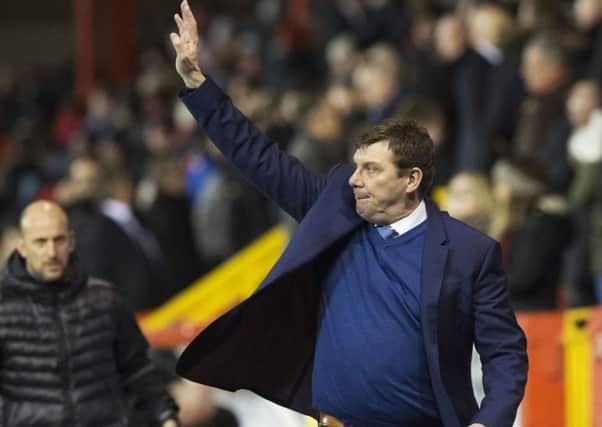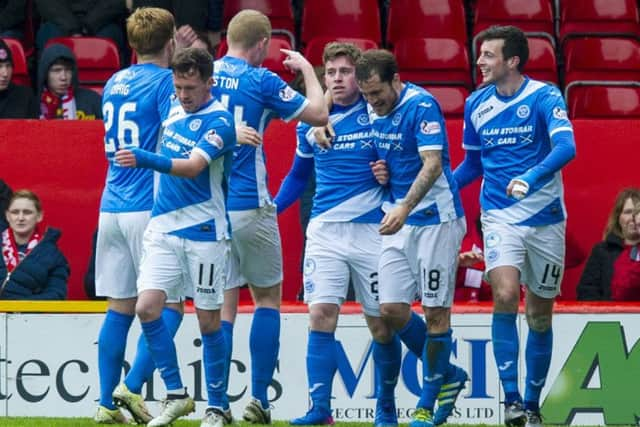Why St Johnstone are Scotland's answer to Atletico Madrid


Neil Lennon laid down a marker for his Hibs side on BT Sport earlier this week. He wants to finish second. Above Aberdeen, Rangers and rivals Hearts. One team which escaped any mention was St Johnstone.
The team which has achieved six successive top six finishes – four under Tommy Wright – three successive top-four finishes, European qualification five out of six seasons, plus a Scottish Cup for good measure. To put that recent record into context, in the last 41 years Saints have finished in the top four only six times, while they had only qualified for Europe twice in their history prior to 2013. The cup success was their first ever major trophy win.
Advertisement
Hide AdAdvertisement
Hide AdOnce again, when it comes to talk about the league’s upper echelons, St Johnstone had been discounted.
With one game remaining they sit only six points behind Rangers, who they welcome to McDiarmid Park on Sunday, while enjoying a 12-point lead over Hearts, opponents they defeated on Wednesday for the fourth time this season.
According to figures revealed in Sporting Intelligence’s Global Sports Salaries Survey, St Johnstone pay an average yearly wage of £47,206 per first-team player. It is the third smallest in the league, only Partick Thistle and Hamilton Academical pay less. Hearts pay just under £40,000-a-year more per player. Rangers’ is 6.7 times that of St Johnstone.
While these figures require to be taken with a trough of salt, it helps illustrate the job Tommy Wright has carried out in Perth. It is becoming part of the Scottish football vernacular, incredulously querying why he has not been approached by ‘bigger’ clubs. The more Pedro Caixinha struggles at Ibrox the louder the Tommy Wright drum beats.
It is quite the enigma for Saints fans. As a provincial club they want their achievements to be recognised, but there is also the fear that the vultures will eventually circle, ready to snatch away the second-best manager in the country.


Appointed assistant to Steve Lomas in 2011, he witnessed and helped lay the foundations under the combustible ex-West Ham United midfielder. Following third and sixth-place finishes, and with his reputation high, Lomas took the decision to head south of the border to manage Millwall. Wright, much to Lomas’ dismay, stayed in Perth and continued to build.
The consistency has been stark. Under Wright, Saints have recorded points totals of 53, 57, 56 and 58. That latter figure was reached following Chris Kane’s strike against a hapless Hearts – a club record in the top tier. And he still has one game in which to break the 60-point mark.
It is testament to the groundwork laid by Wright, and continuously reinforced, year after year. He has lost Stevie May, lost Michael O’Halloran and is about to lose Danny Swanson. All three have provided a resolute side with an x-factor. But they are not the star. The star is the collective.
Advertisement
Hide AdAdvertisement
Hide AdThis pays to Wright’s powers of revival of being able to elicit every iota of talent and buy-in from his players. He has turned Joe Shaugnessy into one of the best central defenders in the country. Liam Craig, Brian Easton, Danny Swanson, Paul Paton, Richard Foster, David Wotherspoon, and Steven MacLean had all regressed or stagnated elsewhere. They’ve all become integral parts of the St Johnstone squad, reliable and dependable.


Wright has taken unfashionable players and moulded them into a fashionable team. A case can be made that every single player in the team is underrated. Recently Tam Scobbie has had to fill in for Steven Anderson, arguably the best centre-back in the league outside of Celtic, and has not skipped a beat.
At the start of the season Craig and Paton would not have been pinpointed as a first choice centre-midfield pairing. But in recent weeks they’ve been required to play together and only once been overrun, at Celtic Park. Their balance and understanding has given Saints a platform.
In attack, MacLean embodies the St Johnstone ethos. When he is unable to play Graham Cummins and Chris Kane rise to lead from the front.
This is a squad which trusts each other and has the trust of their manager. Other than training and setting out the team, Wright likely leaves the players to get on with it having imbued an incredible spirit. It is unlikely he needs to motivate or produce rousing team-talks. Such is the togetherness the squad polices itself, motivating each other – the way the Richard Foster and Danny Swanson bust-up was dealt with emphasises that.
As well as facing criticism for their crowds – an average of 4,360, which is up 12 per cent from last season, is just under 10 per cent of Perth’s population – Saints are often tarred with being no more than rudimentary, one-dimensional cloggers. More often than not by teams they have bettered, beaten and outperformed. They are not, and never will be, the reincarnation of the 1974 Dutch side. But they don’t pertain to be something they are not. If sweeping comparisons were to be made, it would be to Diego Simeone’s Atletico Madrid. They know how to get a result.
The organisation and structure that has been instilled in the side overshadows their crisp, measured passing qualities. They are a devastating counter-attacking team, their full-backs providing thrust, while the wide men move infield and support the forwards. The following may be scoffed by many readers but they are a fascinating team to watch.
Wright doesn’t get bogged down in specialists or over complicating matters. Defenders defend, full-backs defend first and support second. The centre midfielders dovetail, working both ways. The wide men work tirelessly and the forwards defend from the front by being pests.
Advertisement
Hide AdAdvertisement
Hide AdThere is an apocryphal tale of George Graham’s Arsenal defence being tied together by a rope in training so they get used to the correct positioning. Watching St Johnstone you get the sense that the whole team is connected by rope, and it rarely tangles.
Only once this season has Wright got it badly wrong, switching to a back three in what turned out to be a haphazard 2-0 defeat at home to Kilmarnock. The only gripe which could be laid at the Perth Saints is their home form perhaps should have been better – two defeats to Killie, a defeat to Partick Thistle and another to Ross County.
His omission from the shortlist for manager of the year awards should not be seen as a slight. Instead, it speaks volumes of the club’s progress under the 53-year-old, this season is not out of the ordinary, nor a surprise. St Johnstone have done what people expect them to do.
Eventually the time will come when Wright will move on, earning the step-up his success in Perth deserves. But while he is still at McDiarmid Park he will continue to work his magic, and no one should be surprised as he and his St Johnstone side continue to succeed.